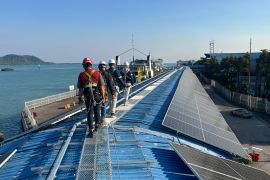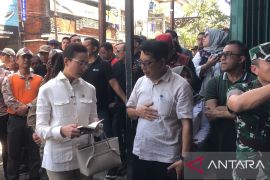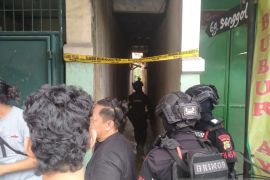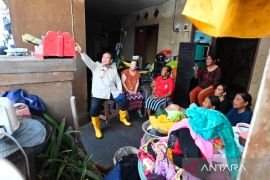The operation, performed by Syrian personnel under the supervision of international disarmament experts, took place under the terms of a UN Security Council resolution that will see Damascus relinquish the banned arms.Damascus (ANTARA News/AFP) - Experts destroyed missile warheads, aerial bombs and chemical mixing equipment Sunday on the first day of a campaign to eliminate Syria`s chemical weapons, the UN said.
The operation, performed by Syrian personnel under the supervision of international disarmament experts, took place under the terms of a UN Security Council resolution that will see Damascus relinquish the banned arms.
Workers "used cutting torches and angle grinders to destroy or disable a range of items", said a statement released by the United Nations and the Organisation for the Prohibition of Chemical Weapons (OPCW).
The Syrian workers were destroying or disabling a "range of items", including "missile warheads, aerial bombs and mixing and filling equipment", the statement added.
The team faces the daunting task of disposing of an estimated 1,000 tonnes of the nerve agent sarin, mustard gas and other banned arms at dozens of sites in Syria by mid-2014.
The experts, who arrived on Tuesday, were also "monitoring, verifying and reporting" whether Assad`s government provided accurate information on its chemical stockpiles.
As the operation got under way, President Bashar al-Assad admitted in an interview that his government had made "mistakes" in the country`s brutal conflict.
But he again denied that his forces used chemical weapons in an August 21 attack that killed hundreds of civilians.
The assault led to threats of a US strike and eventually the UN resolution requiring Syria to turn over its arsenal.
In Damascus, meanwhile, a barrage of mortar rounds slammed into a Christian neighbourhood, killing eight people.
And UN-Arab League envoy Lakhdar Brahimi called on Assad`s regime and the rebels to hold peace talks "without preconditions."
The OPCW has said other methods to render Syria`s production facilities unusable could include explosives, sledgehammers or pouring concrete.
Syria agreed to give up its chemical arsenal under last month`s UN resolution that enshrined an agreement struck between Washington and Moscow aimed at averting US military action.
Under the plan, Syria`s chemical weapons mixing and production facilities must be destroyed by November 1.
UN leader Ban Ki-moon is expected to send a report to the Security Council on Monday setting out in more detail the logistics of what is considered one of the biggest and most dangerous disarmament operations ever staged because the Syria war is still raging.(*)
Editor: Heru Purwanto
Copyright © ANTARA 2013











